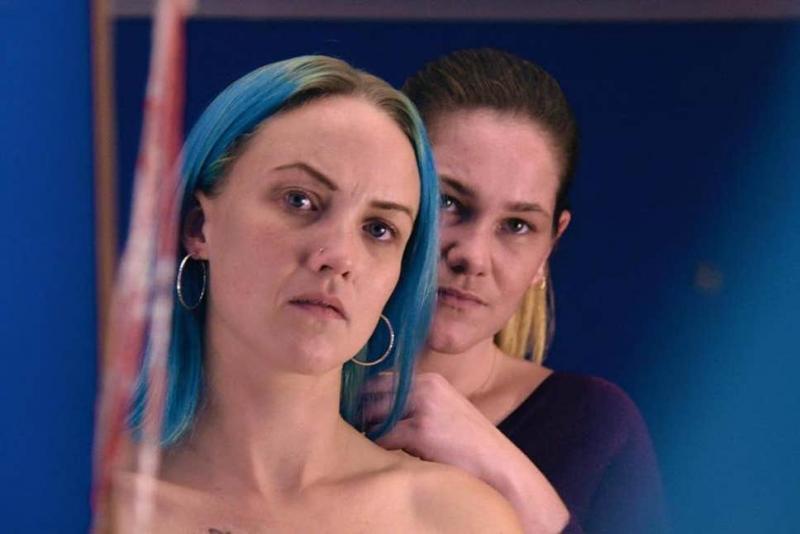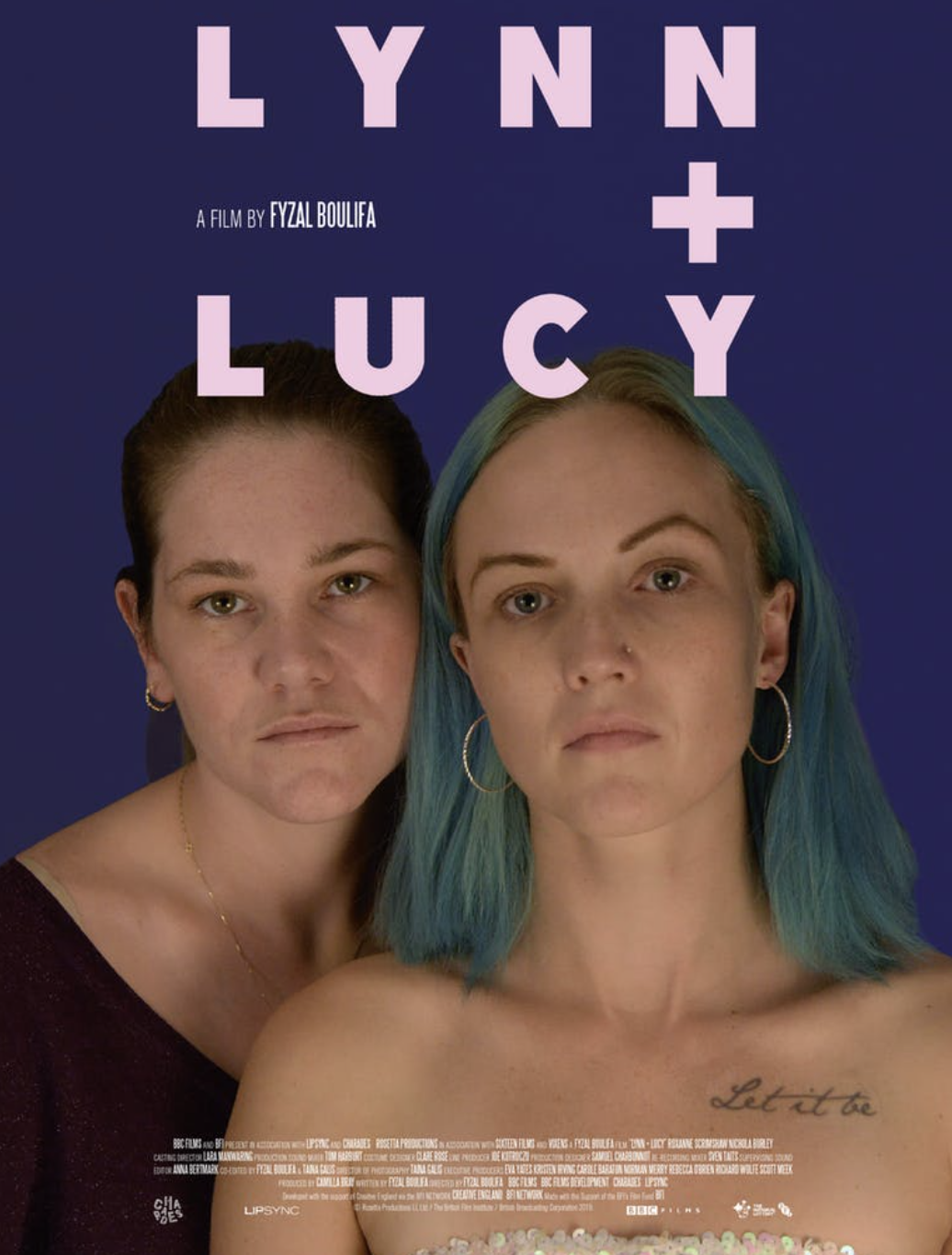Blu-ray: Lynn + Lucy | reviews, news & interviews
Blu-ray: Lynn + Lucy
Blu-ray: Lynn + Lucy
A small town and a lifelong friendship gone sour

If you’re after a relaxing Sunday watch, Fyzal Boulifa’s Lynn + Lucy is not the one. It begins as a story of old friends in a small town and ends as a complex and uncomfortable tragedy.
It opens at the christening for Lucy’s son, Harrison, with a speech given by her best and oldest friend, Lynn (Roxanne Scrimshaw, cast from the street and interviewed with others in the extras), who had her own child at the age of 16. Lucy’s partner, Clark, is far younger than her, something that is highlighted when they argue before a night out, the green light of the games on his computer monitor backgrounding the scene. There is some sense of unease, the faint signs of postnatal depression that are so terribly reinterpreted later on in the film. Neither of their lives are perfect, Lynn watched by a disinterested husband and embarking on her first-ever job, sweeping floors at the hair salon of an old school enemy. Lynn and Lucy (Nichola Burley) have each other, though.
 But soon their relationship twists and becomes toxic, Lynn feeding off the ruins of Lucy’s life in the wake of the suspicious death of Harrison. The vigilante tendency of small communities is examined and exploited, as rumours swell out of all proportion and become fatal. The suspicions and the hatred grow as the two protagonists split apart, climaxing in an almost primal shaming scene where Lynn’s new friends watch as Lynn shears Lucy’s hair clumsily off, and Lucy smiles briefly. Moments like these are what the film does so well, but they can also be its downfall, becoming laboured metaphors.
But soon their relationship twists and becomes toxic, Lynn feeding off the ruins of Lucy’s life in the wake of the suspicious death of Harrison. The vigilante tendency of small communities is examined and exploited, as rumours swell out of all proportion and become fatal. The suspicions and the hatred grow as the two protagonists split apart, climaxing in an almost primal shaming scene where Lynn’s new friends watch as Lynn shears Lucy’s hair clumsily off, and Lucy smiles briefly. Moments like these are what the film does so well, but they can also be its downfall, becoming laboured metaphors.
The cinematography of Lynn + Lucy is beautiful, pulling glimpses of lushness out of daily life. There are some excellent tableaux – in one, Lynn looks out of the window at the wilted silver balloons from Harrison’s memorial, profane graffiti scrawled on her windowpane, as Lucy walks across in her silver coat. In another, a drunk and enraged Lucy is dragged out of a pub whilst Lynn’s profile remains impassively staring forwards.
Lynn + Lucy demonstrates very well how blame can infect and corrupt, symbolised in an almost throwaway moment when a client at the hair salon picks up a salacious gossip magazine. The powers-that-be seem intent on finding either Lucy or Clark to blame, and this is what Lynn picks up on, first defending her friend, then fanning the flames as suspicion turns on her. Lynn is a complex character, her infrequent speech leaving yawning gaps of interpretation for others to create their own readings of what really happened. The audience, likewise, can project their ideas of her character on to her, but Boulifa effectively confounds these expectations. There is no villain as such, but Lynn, and the film as a whole, is an excellent demonstration of how the most unobtrusive people can at once exploit and be exploited by a society that is always looking for a scapegoat.
rating
Explore topics
Share this article
The future of Arts Journalism
You can stop theartsdesk.com closing!
We urgently need financing to survive. Our fundraising drive has thus far raised £49,000 but we need to reach £100,000 or we will be forced to close. Please contribute here: https://gofund.me/c3f6033d
And if you can forward this information to anyone who might assist, we’d be grateful.

Subscribe to theartsdesk.com
Thank you for continuing to read our work on theartsdesk.com. For unlimited access to every article in its entirety, including our archive of more than 15,000 pieces, we're asking for £5 per month or £40 per year. We feel it's a very good deal, and hope you do too.
To take a subscription now simply click here.
And if you're looking for that extra gift for a friend or family member, why not treat them to a theartsdesk.com gift subscription?
more Film
 London Film Festival 2025 - crime, punishment, pop stars and shrinks
Daniel Craig investigates, Jodie Foster speaks French and Colin Farrell has a gambling habit
London Film Festival 2025 - crime, punishment, pop stars and shrinks
Daniel Craig investigates, Jodie Foster speaks French and Colin Farrell has a gambling habit
 I Swear review - taking stock of Tourette's
A sharp and moving tale of cuss-words and tics
I Swear review - taking stock of Tourette's
A sharp and moving tale of cuss-words and tics
 A House of Dynamite review - the final countdown
Kathryn Bigelow's cautionary tale sets the nuclear clock ticking again
A House of Dynamite review - the final countdown
Kathryn Bigelow's cautionary tale sets the nuclear clock ticking again
 theartsdesk Q&A: Idris Elba on playing a US President faced with a missile crisis in 'A House of Dynamite'
The star talks about Presidential decision-making when millions of lives are imperilled
theartsdesk Q&A: Idris Elba on playing a US President faced with a missile crisis in 'A House of Dynamite'
The star talks about Presidential decision-making when millions of lives are imperilled
 Urchin review - superb homeless drama
Frank Dillane gives a star-making turn in Harris Dickinson’s impressive directorial debut
Urchin review - superb homeless drama
Frank Dillane gives a star-making turn in Harris Dickinson’s impressive directorial debut
 Mr Blake at Your Service review - John Malkovich in unlikely role as an English butler
Weird comedy directed by novelist Gilles Legardinier
Mr Blake at Your Service review - John Malkovich in unlikely role as an English butler
Weird comedy directed by novelist Gilles Legardinier
 Don't Let's Go to the Dogs Tonight review - vivid adaptation of a memoir about a Rhodesian childhood
Embeth Davidtz delivers an impressive directing debut and an exceptional child star
Don't Let's Go to the Dogs Tonight review - vivid adaptation of a memoir about a Rhodesian childhood
Embeth Davidtz delivers an impressive directing debut and an exceptional child star
 One Battle After Another review - Paul Thomas Anderson satirises America's culture wars
Leonardo DiCaprio, Teyana Taylor, and Sean Penn star in a rollercoasting political thriller
One Battle After Another review - Paul Thomas Anderson satirises America's culture wars
Leonardo DiCaprio, Teyana Taylor, and Sean Penn star in a rollercoasting political thriller
 Steve review - educator in crisis
Cillian Murphy excels as a troubled headmaster working with delinquent boys
Steve review - educator in crisis
Cillian Murphy excels as a troubled headmaster working with delinquent boys
 Can I get a Witness? review - time to die before you get old
Ann Marie Fleming directs Sandra Oh in dystopian fantasy that fails to ignite
Can I get a Witness? review - time to die before you get old
Ann Marie Fleming directs Sandra Oh in dystopian fantasy that fails to ignite
 Happyend review - the kids are never alright
In this futuristic blackboard jungle everything is a bit too manicured
Happyend review - the kids are never alright
In this futuristic blackboard jungle everything is a bit too manicured

Add comment